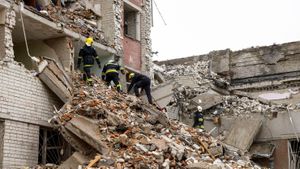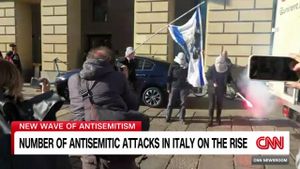Immigration and Customs Enforcement (ICE) has ramped up its crackdown on illegal immigration, making significant strides in recent weeks with more than 7,400 arrests reported within just nine days of aggressive operations. The series of raids, authorized under President Trump’s directives, has predominantly targeted violent offenders and gang members involved in criminal activities across several states including New York, Chicago, and Boston.
According to reports, ICE officers executed multiple raids across homes, workplaces, and other locations, leading to over 6,000 detainers put forth to arrest individuals deemed to be illegally residing within the country. Among the apprehended were members of notorious gangs, Tren de Aragua and MS-13, with authorities emphasizing their focus on the “worst of the worst” illegal migrants, as described by Secretary of Homeland Security Kristi Noem.
The surge of arrests began on January 31, following the administration’s commitment to combating illegal immigration. Notably, the operations reportedly netted 962 arrests on one day alone, making clear the high stakes involved. John Fabbricatore, former chief of ICE’s Denver office, noted, “President Trump promised to make America safe. And this is the first wave of those promises, where ICE agents are going out and making arrests of criminal illegal aliens.”
One of the most high-profile arrests was of Anderson Zambrano-Pacheco, 26, identified as the alleged ringleader of the Tren de Aragua gang. Zambrano-Pacheco drew attention due to his involvement in a viral video where armed members forcibly entered an apartment complex. Another troubling case involved Luis Adolfo Guerra Perez, a 19-year-old MS-13 member arrested on gun charges after being ordered deported previously but released by the Boston court.
The immediate plan for some of those apprehended includes housing them at Guantánamo Bay, as confirmed by Secretary of Defense Pete Hegseth. He indicated the need to prepare the facility for possible detention of up to 30,000 “criminal illegal aliens,” and stated, “all options will be on the table” concerning military action against cartels.
The aggressive stance has sparked varied reactions from local communities. Some residents have expressed relief and support for the ICE operations, welcoming the presence of law enforcement targeting criminals who contribute to unrest and insecurity. Ramses Frías, a local activist from Queens, commented, “Many residents, from immigrants to citizens, welcome ICE coming in and taking the criminals out of these communities.”
Conversely, not everyone has cheered the crackdowns. Officials from Chicago and Boston have reiterated commitments to maintain their sanctuary city status, pledging to resist cooperation with federal enforcement actions. Mayor Brandon Johnson of Chicago expressed his position against the raids, reaffirming the city’s commitment to protecting its immigrant population.
The volume of arrests by ICE since the beginning of the crackdown highlights the administration's strategic focus on ensuring safety within urban areas. Not only has ICE targeted individual offenders, but it has also initiated joint efforts with federal agencies including the Drug Enforcement Agency (DEA) and the Bureau of Alcohol, Tobacco, Firearms and Explosives (ATF) to dismantle criminal networks and uphold law and order.
This large-scale immigration operation is part of President Trump's efforts to fulfill his promise of prioritizing safety and security through strict immigration policies. The Daily numbers of arrests and deportations have been visible on ICE’s social media accounts, showcasing their commitment to transparency.
The aggressive initiative appears to be only the beginning, as federal authorities continue to mobilize resources and reinforce their enforcement strategies. With community sentiment divided and the political response varying from support to resistance, the path forward remains complex.



